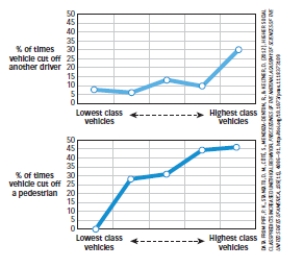Use the following to answer questions
Scenario I
Scenario I is based on and presents data from the following study (reproduced from p.25 of the textbook) :
Piff,P.K. ,Stancato,D.M. ,Côté,S. ,Mendoza-Denton,R. ,& Keltner,D.(2012) .Higher social class predicts increased unethical behavior.PNAS Proceedings of the National Academy of Sciences of the United States of America,109(11) ,4086-4091.doi:10.1073/pnas.1118373109
Piff and colleagues (2012) used naturalistic observation techniques to determine if wealthy people behaved more or less ethically than people who were not wealthy.In one study,observers stood at a busy intersection and recorded the make,model,and year of each approaching car.They also noted if the car cut off other cars or pedestrians at this intersection.
Major findings of Piff et al.(2012) are presented in Figure 1.1.This figure shows the percentage of times vehicles cut off another driver (top panel) or pedestrians (lower panel) as a function of the social status of the vehicles (with more expensive cars ranked higher in social status) .
Figure 1.1 
-(Scenario I) A psychologist believes that selfishness is a genetically based trait that confers advantages in terms of resource acquisition.As such,the psychologist is not surprised in the least that selfish people drive expensive cars.This _____ would predict that _____.
Definitions:
Over Time
Refers to the duration or period during which events or processes occur or continue.
Retrieval Cues
Stimuli or signals that can trigger the memory of previously learned information, facilitating recall.
Conscious Associations
Conscious associations are the connections that an individual is aware of making between different ideas, memories, or concepts.
New Course Material
Education resources or content that have been recently developed or updated for instructional use.
Q8: How does the data-based approach discover middle-level
Q85: Robert Sternberg believed there are three kinds
Q97: In Pavlov's classic experiment,the sound of a
Q124: There is a case of a woman
Q148: Betsy went to a restaurant last night
Q172: A mode of thought in which we
Q178: This component of working memory allows us
Q223: The anthropologist Margaret Mead introduced the evolutionary
Q236: Which psychologist is MOST associated with stimulus-response
Q342: After suffering a stroke,Irma could no longer